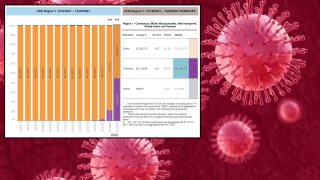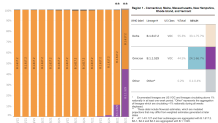
The omicron variant of COVID-19 continues to spread in New England, but it still is not dominant, according to the latest data from the U.S. Centers for Disease Control and Prevention -- which also revised down the agency estimate of omicron's prevalence the week before.
Omicron accounted for 45.5% of the total COVID cases in Massachusetts, Connecticut, New Hampshire, Rhode Island, Maine and Vermont between Dec. 19 and Dec. 25, according to the newest CDC Nowcast estimate.
WATCH ANYTIME FOR FREE
>Stream NBC10 Boston news for free, 24/7, wherever you are. |
That's only slightly more than what the agency had estimated last week -- 37.7% -- but the new update decreased the estimate of omicron's prevalence that week down to 11.1%.

Get updates on what's happening in Boston to your inbox. Sign up for our >News Headlines newsletter.
The CDC's estimate of omicron's spread that week was decreased nationwide as well, from 73% of new infections to 22.5%.
CDC’s estimates are based on thousands of coronavirus specimens collected each week through university and commercial laboratories and state and local health departments. Scientists analyze their genetic sequences to determine which versions of the COVID-19 viruses are most abundant.
The data comes from the agency's Nowcast, which extrapolates how much COVID variants have spread "based on genomic surveillance data from previous weeks," it explains on a webpage, noting that estimates for previous weeks can change as more data come in. The strategy is important because it can take a few weeks for a COVID sample's genes to be sequenced, confirming what kind of variant it is.
Still, experts told The New York Times Tuesday that, while the revisions aren't surprising, the CDC could have done a better job conveying how uncertain its estimates are.
"The 73 percent [projection last week] got a lot more attention than the confidence intervals," University of Wisconsin-Madison virologist Dr. David O'Connor told the newspaper.
Much about the omicron variant remains unknown, including whether it causes more or less severe illness. Early studies suggest the vaccinated will need a booster shot for the best chance at preventing omicron infection but even without the extra dose, vaccination still should offer strong protection against severe illness and death.
Various new variants of COVID have swept across the globe since the start of the pandemic as the virus mutates.



